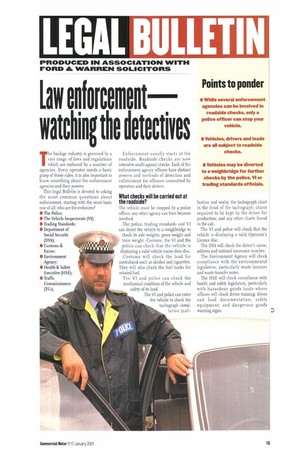In enforcement watching the detectives
Page 17

If you've noticed an error in this article please click here to report it so we can fix it.
The haulage industry is governed by a vast range of laws and regulations which are enforced by a number of agencies. Every operator needs a basic grasp of these rules; it is also important to know something about the enforcement agencies and their powers.
This Legal Bulletin is devoted to asking the most common questions about enforcement, starting with the most basic one of all: who are the enforcers?
• The Police; • The Vehicle Inspectorate (VI); • Trading Standards; • Department of Social Security (DSS); • Customs & Excise; • Environment Agency; • Health & Safety Executive (HSE); • Traffic Commissioners (TCs). Enforcement usually starts at the roadside. Roadside checks are now intensive multi-agency checks. Each of the enforcement agency officers have distinct powers and methods of detection and enforcement for offences committed by operators and their drivers.
What checks will he carried out at the roadside?
The vehicle must be stopped by a police officer; any other agency can then become involved.
The police, trading standards and VI can direct the vehicle to a weighbridge to check its axle weights, gross weight and train weight Customs, the VI and the police can check that the vehicle is displaying a valid vehicle excise duty disc.
Customs will check the load for contraband such as alcohol and cigarettes. They will also check the fuel tanks for rebated fuel.
The VI and police can check the mechanical condition of the vehicle and safety of its load.
The VI and police can enter the vehicle to check the tachograph installation (call bration and seals); the tachograph chart in the head of the tachograph; charts required to be kept by the driver for production; and any other charts found in the cab.
The VI and police will check that the vehicle is displaying a valid Operator's Licence disc.
The DSS will check the driver's name, address and national insurance number.
The Environment Agency will check compliance with the environmental legislation, particularly waste licences and waste transfer notes.
The HSE will check compliance with health and safety legislation, particularly with hazardous goods loads where officers will check driver training; driver and load documentation; safety equipment; and dangerous goods warning signs.
































































































